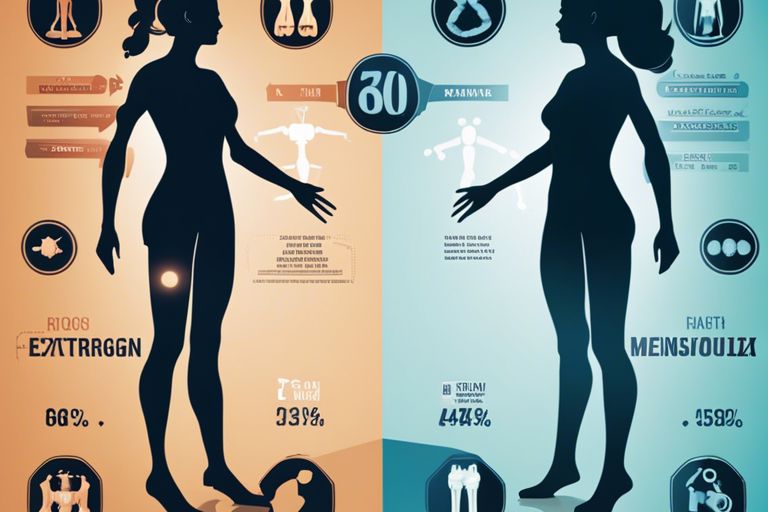Menopause is a natural biological process that all women go through, marking the end of their reproductive years. Along with the cessation of menstruation and hormonal fluctuations, menopause can also bring about changes in weight. Weight gain during menopause is a common concern for many women, attributed to hormonal changes, ageing, and lifestyle factors. Understanding the causes of weight gain during menopause is crucial in developing effective control strategies. In this blog post, we will explore the various factors that contribute to weight gain during menopause and provide evidence-based control strategies to help women manage their weight and maintain overall health during this life stage.
Key Takeaways:
- Menopause can lead to weight gain: Hormonal changes during menopause can cause weight gain, particularly around the abdomen area.
- Decreased metabolism: As women age, their metabolism naturally slows down, making it easier to gain weight and harder to lose it.
- Loss of muscle mass: During menopause, women may experience a loss of muscle mass, which can further contribute to weight gain.
- Control strategies: Regular exercise, a healthy diet rich in fruits and vegetables, and strength training can help women manage weight gain during menopause.
- Hormone replacement therapy (HRT): HRT can help alleviate symptoms of menopause, including weight gain, but should be discussed with a healthcare provider due to potential risks.
Biological Causes of Weight Gain During Menopause
Hormonal Changes
During menopause, hormonal changes such as a decrease in oestrogen levels can lead to an increase in fat accumulation, particularly around the abdomen. This shift in hormones can also contribute to a decrease in muscle mass, which in turn can lower the body’s calorie-burning capacity.
Metabolism Shifts
Metabolism shifts during menopause can also play a significant role in weight gain. As women age, their metabolism naturally slows down, leading to fewer calories being burned at rest. Additionally, the decrease in muscle mass mentioned earlier further contributes to this slowdown in metabolism.
Metabolism refers to the process by which your body converts what you eat and drink into energy. As you age, your metabolism naturally slows down, leading to a decrease in the number of calories burned at rest. This, combined with hormonal changes during menopause, can create a perfect storm for weight gain.
Lifestyle Factors Affecting Weight Gain in Menopause
Dietary Habits
During menopause, changes in dietary habits can significantly impact weight gain. Hormonal fluctuations can affect metabolism and increase cravings for unhealthy, high-calorie foods. It is crucial to focus on a balanced diet rich in fruits, vegetables, whole grains, and lean protein to support overall health and manage weight during this transition.
Physical Activity Level
Maintaining a consistent level of physical activity is crucial in managing weight during menopause. Regular exercise not only helps burn calories but also supports muscle strength and bone density, which are negatively affected during this stage of life. Perceiving exercise as a priority and incorporating different types of activities such as cardio, strength training, and flexibility exercises can help combat weight gain effectively.
Strategies for Controlling Weight Gain in Menopause
Nutrition and Diet Adjustments
During menopause, it is crucial to make adjustments to your nutrition and diet to manage weight gain effectively. Focus on a balanced diet rich in fruits, vegetables, whole grains, and lean proteins. Limiting processed foods, sugars, and saturated fats can help reduce calorie intake and support weight management.
Exercise and Strength Training
Regular exercise and strength training are vital components in controlling weight gain during menopause. Aim for at least 150 minutes of moderate-intensity aerobic activity per week, combined with strength training exercises targeting major muscle groups. This can help boost metabolism, maintain muscle mass, and prevent the loss of bone density that often occurs during menopause.
Medical Interventions and Support
Hormone Replacement Therapy (HRT)
Hormone Replacement Therapy (HRT) is a common medical intervention to manage menopausal symptoms, including weight gain. HRT involves taking hormones like oestrogen and progesterone to replace the ones the body no longer produces in sufficient quantities. By restoring hormonal balance, HRT can help alleviate symptoms such as hot flushes, mood swings, and weight gain. It is crucial to consult with a healthcare professional before starting HRT to discuss the potential benefits and risks.
Alternative Therapies and Supplements
For those seeking alternatives to hormone replacement therapy, various alternative therapies and supplements may offer relief from menopausal symptoms, including weight gain. These may include herbal remedies, such as black cohosh and red clover, as well as supplements like omega-3 fatty acids and vitamin D. While these alternative options are widely used, it is crucial to consult with a healthcare provider or a qualified herbalist to ensure their safety and effectiveness.
Conclusion
Menopause can often lead to weight gain due to hormonal changes, ageing, and lifestyle factors. Understanding the causes, such as hormonal shifts and slower metabolism, is crucial in developing effective control strategies. Incorporating a healthy diet rich in fruits, vegetables, and whole grains, along with regular exercise, can help manage weight gain during menopause. Additionally, staying hydrated, getting enough sleep, and managing stress levels are necessary in maintaining a healthy weight. By implementing these control strategies, women going through menopause can better manage weight gain and enjoy a healthier lifestyle.
FAQ
Q: What is menopause and how does it contribute to weight gain?
A: Menopause is a natural biological process that marks the end of a woman’s menstrual cycles. During menopause, hormonal changes can lead to a decrease in metabolism and changes in fat distribution, which may contribute to weight gain.
Q: What are the causes of weight gain during menopause?
A: The primary causes of weight gain during menopause include hormonal changes, a decrease in muscle mass, lifestyle factors such as diet and exercise, as well as genetic predispositions.
Q: How can diet help control weight gain during menopause?
A: A balanced diet rich in fruits, vegetables, whole grains, and lean proteins can help control weight gain during menopause. Avoiding processed foods high in sugars and unhealthy fats is also important in managing weight.
Q: What role does exercise play in managing weight gain during menopause?
A: Regular physical activity, including both aerobic exercises and strength training, can help boost metabolism, build muscle mass, and control weight gain during menopause. Aim for at least 150 minutes of moderate-intensity exercise per week.
Q: Are there any other strategies to help control weight gain during menopause?
A: Along with a healthy diet and regular exercise, other strategies to manage weight gain during menopause include getting an adequate amount of sleep, managing stress levels, and staying hydrated by drinking plenty of water throughout the day. Additionally, consulting with a healthcare provider for personalised advice and support is recommended.





